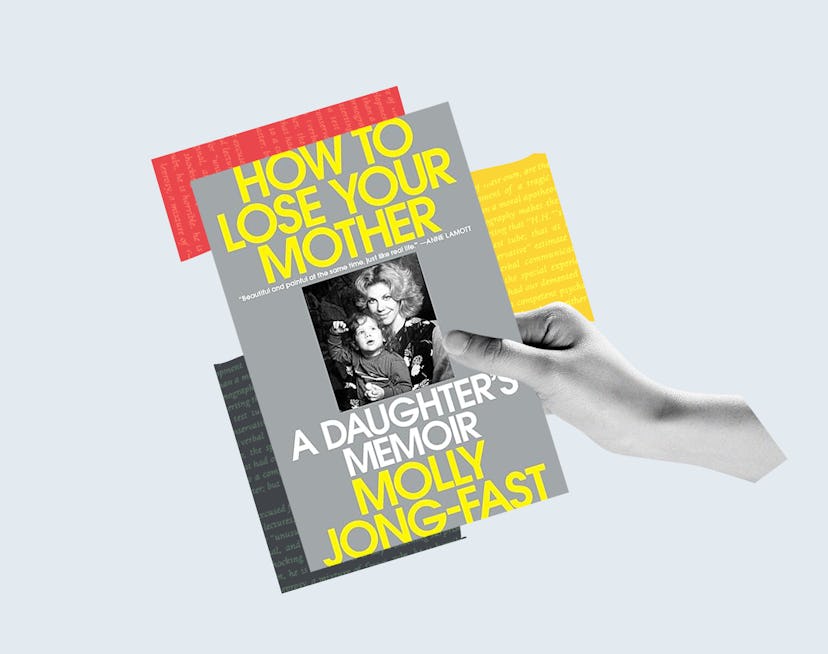Bustle Book Club
Molly Jong-Fast Wrote Her Memoir For You
The author hopes the public will find relief in reading How to Lose Your Mother.

Molly Jong-Fast was reticent to write How to Lose Your Mother, her memoir about her mom, Fear of Flying author Erica Jong. “What I didn’t want was to subject other people to my therapy,” Jong-Fast, 46, tells Bustle. But after her mom was diagnosed with dementia during the pandemic — and Jong-Fast took control of her care, which she continues to manage today — she started to see the universality in their highly specific, often thorny relationship.
In part, she credits the teachings of Alcoholics Anonymous for inspiring her to share her story. “Seeing how your experience can help others is a core part of the program,” the journalist and political commentator says. “And I felt like this was a situation where people could see that [having a sick parent] is something you can get through.”
It was in AA meetings, which she started attending at 19, that Jong-Fast first worked through her relationship with her mother. Jong’s literary fame — spurred by Fear of Flying, a massive bestseller and a defining feminist text of the ’70s — cast a shadow over them both and fed into Jong’s narcissism, clout-chasing, and emotional absence. It wasn’t easy being her daughter. But as Jong-Fast talked through her past, she began to understand that addiction is a family disease, which her mother and maternal grandmother suffered from as well.
Throughout the memoir, Jong-Fast explores the many ways alcohol contributed to her mother’s career decline as well as their strained relationship. And in writing it all down, Jong-Fast gives her mother a profound gift: a breathtakingly honest portrait of her life that invites reflection and redefines her legacy. “My mom has always been super distraught not to be Joan Didion or a Nora Ephron. Nora Ephron is such a great example of how, if you’re not an alcoholic, you can have this big career where you write, make movies, and get to evolve and change,” Jong-Fast says of her mother’s literary peers. “My mother wasn’t able to evolve and change because she drank.”
Now, having come to terms with her mother’s shortcomings, she’s found herself able to celebrate her triumphs as well. “Fear of Flying sold 25 million copies! It’s insane. It shot her into the world and made her an icon,” says Jong-Fast.
Below, Jong-Fast reflects on Costco sheet cake, right-wing biographies, and her love enduring love of Diet Coke.
On the 1,000-page book she can’t put down:
I just read the William F. Buckley biography, [Buckley by Sam Tanenhaus]. It’s actually, weirdly, a page-turner, which you don’t think of when you think of a 1,000-page biography. But it’s really about the roots of right-wing media and how they led to Trumpism. It’s very long but brilliantly done.
On forgoing anything carbonated:
I got strep throat 10 years ago, and it got into my vocal cord, which is now very weak. So I can’t drink fizzy water. I occasionally drink Diet Coke, but I’m really not supposed to. I usually drink ginger shots because it helps with the inflammation. I have these throat coat drops that work really well. I used to swear by Vocal Eze, but they changed the formula to be sugar-free, and it sucks. Who wants sugar-free?
On the sweet treat she’s become known for:
I don’t need fancy cake; I just need quantity and very sweet frosting. So my dream cake is a Costco sheet cake.
One of the very exciting moments of my life was when I called down to get room service at a hotel recently, and the guy was like, “Do you want cake? I heard you on [the podcast] How Long Gone talking about how much you love cake.” I was like, “I’ve arrived!”
On beating writer’s block — thanks to the news cycle:
What gets me out of a rut is the complete disaster that is the American political moment. I mean, you can’t be thinking about yourself when you are thinking about what’s happening right now. So it’s hard to be super self-involved — though I manage — in a moment like this.
This interview has been edited and condensed for clarity.